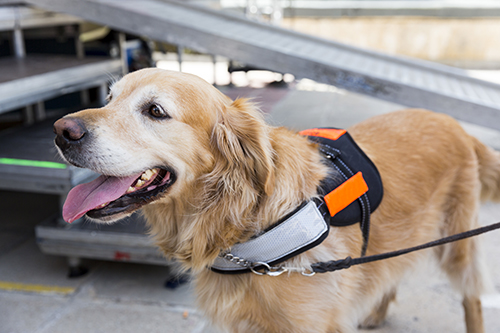These days, there may be some confusion regarding the laws surrounding service animals and emotional support animals for those who own rental properties. The department of Housing and Urban Development (HUD) provides very detailed guidelines for property managers and owners to use so they may ensure they are in compliance with fair housing laws when it comes to renting to people who have these types of animals.
How is an Assistance Animal Defined?
Assistance animals fall into two categories - service animals and support animals. A service animal is defined by the Americans with Disabilities Act (ADA) as a dog that is individually trained to do work or perform tasks for the benefit of a person with a disability. Other trained or untrained animals that do work, perform tasks, or provide assistance or therapeutic/emotional support for individuals with disabilities are typically termed support animals.
Proof of Assistance Animal Status
The Fair Housing Act (FHA) requires that landlords make reasonable accommodations for people with disabilities and this includes allowing service animals and support animals at rental properties. But, how do you know that an animal falls into one of these categories and isn't simply a pet that a person is trying to get allowed into a home it otherwise wouldn't be? Well, there are some screening questions that can be asked of prospective renters that conform with HUD guidelines and FHA requirements. These questions allow property managers and landlords to determine whether an animal qualifies as a service or support animal.
There are different criteria for qualifying service animals and support animals. While there is no documentation needed for a service animal, a landlord may ask what work or task the animal has been trained to do. Per the FHA, documentation can be requested for a support animal. These days, it is relatively easy for anyone to go on the internet, pay some money and get a certificate stating that their animal is a support animal. HUD has advised that these certificates are generally not sufficient to reliably establish the need for an assistance animal. Rather, it is advisable that landlords and property managers request documentation from legitimate, licensed healthcare professionals stating the assistance or support the animal will provide. It’s also important to keep in mind that the healthcare professional does not have to reveal the specific condition of the person in question, only the assistance or support the animal will provide and that the animal is necessary in their professional opinion.
What About Pet Fees, Breed Restrictions & Damages?
So, what does this mean for pet fees, breed restrictions and potential property damages? If an animal qualifies as an assistance animal, landlords may not charge fees for processing these reasonable accommodation requests. Exclusionary rules also do not apply to service and support animals. This means landlords cannot place limitations on the breed or size of these animals.
However, they can make limitations based on proven past behavior of the animal - i.e. if the animal destroyed a past rental or has a record of posing a threat to neighbors, it may not have to be allowed at a property. Landlords are also prohibited from charging pet deposits, fees or any other kind of surcharge for assistance animals. This does not, however, relieve tenants of responsibility for any damages caused by the animal at the end of their lease - they are still responsible for its conduct.
These rules and regulations can get quite tricky and in depth, especially for those who are trying to self-manage their investment properties. Experienced property managers are intimately familiar with these laws and know how to properly screen these types of animals while at the same time protecting property owners from inadvertently breaking any laws and protecting their properties should there be any animal-related damages.
If you have questions about allowing assistance animals in your rental property or would like to discuss what a professional property manager could do for you, please reach out to the professionals at Sweyer today.



